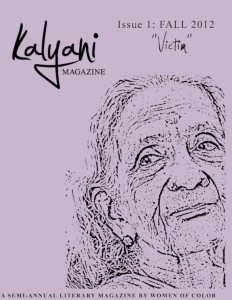Kalyani Magazine, a new semi-annual literary journal by women of color, has made a promising first step towards its mission of “providing a voice to those who are often voiceless.” The magazine’s inaugural issue centers on the powerful (and controversial) theme of “Victim,” offering the diverse perspectives and strong emotional responses that the word naturally invites.
The fiction, memoir, and poetry in this issue explore what victimhood means to individuals and to society at large. The writers provide a variety of definitions of the term: “victim” can be used to describe a person in temporary condition from which they can escape or it can serve to characterize someone unjustly persecuted over the course of a lifetime. It can define someone suffering for a specific reason or for no reason at all. The oppressor can be another human being or the strict traditions and practices of a culture. “Victimhood” can be a label, sometimes misapplied, or it can inspire unbelievable strength in those who withstand the storms of life. Kalyani’s contributors tackle these complexities with skill and dignity. Many works focus on the victims of physical abuse and domestic violence, striking a powerful chord in the heart of every woman.
Exploring the fascinating interplay between hurt, healing, submission, and defiance, the poetry featured in this issue aims to make sense of victimhood and the influence that such a state has over the human spirit. Some of the poems use a generational framework to give an outsider’s view of a woman’s vulnerability; in “Familiar Face,” for instance, Nivea Castro records the discovery of another’s victimhood, tracing a younger woman’s awakening to her grandmother’s brutal past. Other poets choose to use the power and beauty of language itself to capture the pain of becoming a victim as well as the freedom that comes from moving forward. Danielle Mazzeo’s “Misnomer” and Larissa Melo Pienkowski’s “confissão” are standouts in this regard. The vivid imagery and sensory descriptions of these poems allow readers to share in the experience of a whole internal universe regaining its balance and righting itself after a period of despair and trial.
Though poetry is the strongest genre in Kalyani’s first issue, there is certainly some promising prose tucked into its pages. These works document victimhood from the outside looking in as well as from the very thick of the situation, showing how all those involved try – each in their own way – to offer some explanation, to find out where it all went wrong. “La Cuchara” by Yovani Flores describes the confusion of a witness and the difficulty of living with a sense of guilt about another’s fate. Bhumkia Muchhala takes the reader a step back in “Metanoia” as a woman facing her wedding day analyzes certain cultural expectations for marriage and wonders if those expectations foster hostility or harmony in the relationships that surround her.
Kalyani Magazine provides much food for thought in its provocative first issue. The journal features a remarkable number of women of color who are having their writing published for the first time; it is a testament to the power of the theme and to the space that Kalyani has provided for women to explore it that so many new wordsmiths have come forward. Their work freely investigates the pain of victimhood and the peace that comes from once again standing with strength – and the reader cannot help but be moved by their honesty.
Please check out www.kalyanimagazine.com for more information about the journal.


